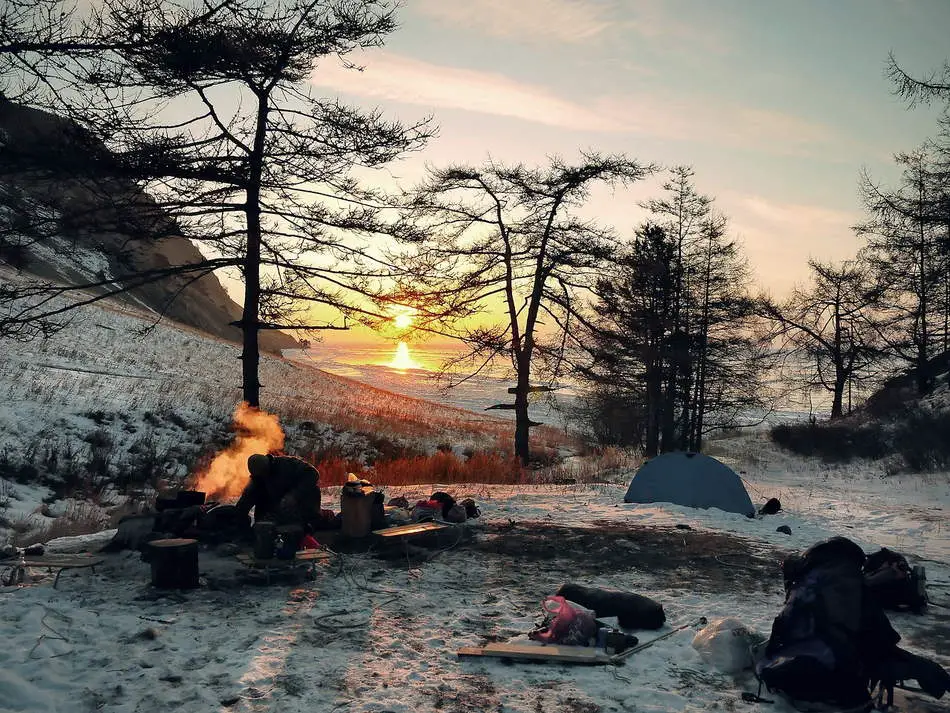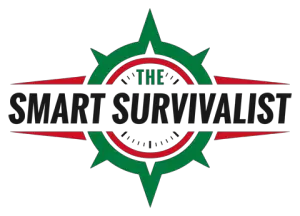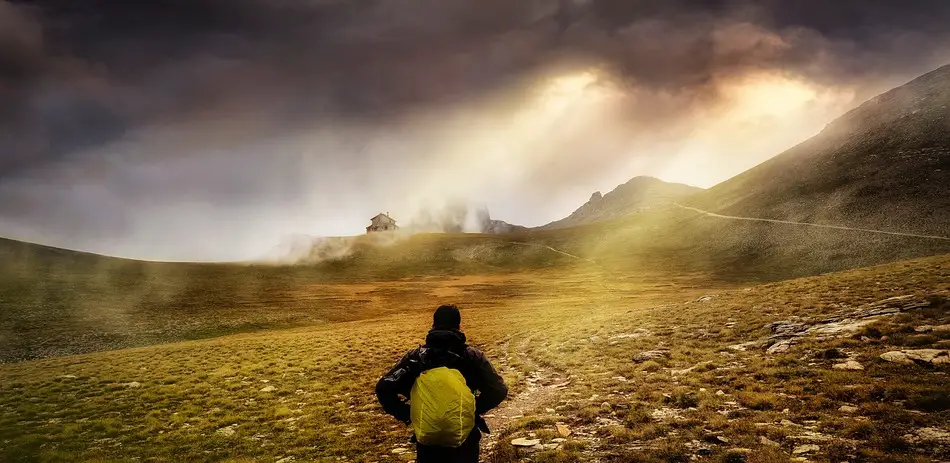When facing dangerous circumstances, such as being stranded in the wild or escaping a disaster (natural or man-made), there are a few basic rules that should always be on your mind. They will guide you as you use your skills to survive. One of them is the survival rule of fours. I frequently found out just how important it is.
So what is the survival rule of fours? To put it simply, it’s the golden rule of how long you can survive without these necessities:
- You can survive 4 minutes without air
- You can survive 4 hours without shelter
- You can survive 4 days without water
- You can survive 4 weeks without food
This rule applies to an average person and urges you to prioritize your actions in order to survive as long as you can, until you are safe or until help arrives.
However, knowing this basic rule of fours is not enough. What skills and knowledge do you need to possess in order to implement this rule for the sake of your survival? How does this rule save you? Let’s dive in for more details, as I will do my best to clarify this topic.
Survival Rule of Four – What Is It About?
As stated earlier, you have a limited time to survive without the following 4 survival priorities: air, shelter (in harsh conditions), water and food. The first two are the shortest ones: your body is being directly attacked by the lack of air or by icy temperatures (for example), and you have to act immediately. Once you’re safe, you have enough time to scout for water and food, replenishing your body’s energies.
The rule of fours does not tell you that you should see whether you can survive this long without these crucial factors. Rather, it encourages you to check your priorities and deploy your skills and abilities appropriately. Let us take a look at every mentioned necessity and what skills and gear are required to obtain this necessity.
4 Minutes Without Air
When you find yourself in a heavily polluted area, when there is smoke or toxic gases around you, you don’t have much time until you pass out and eventually die. You need breathable air to live, plain and simple.
As your survival instincts kick in, your actions should be focused and very brief. You can place a wet cloth against your mouth and leave the contaminated area as quick as possible. However, if the area is too large, the cloth might not be enough.
In situations like these, your bugout bag should include something like BASE CAMP Breathing Mask (available on Amazon). This reliable air filtration mask will safely protect from 99% of dust, fumes, smoke, chemicals and allergens in the air. This could be exactly what you need when facing deadly disasters like industrial fires, wildfires and volcanic eruptions.
The BASE CAMP mask is currently out of stock. It was sold out due to the COVID-19 outbreak. Nonetheless, you can browse other high quality dust masks here.
4 Hours Without Shelter
Of course, we are talking about extreme conditions, not camping outside when the weather is fair. Exposure to such elements as freezing cold, non-stopping rain or scorching heat can quickly lead to your demise. Sunstroke or hypothermia will shorten your survival.
If you cannot locate an abandoned structure or even a cave, you will need to set up a shelter in the middle of the wilderness. If you’re carrying a tent or some other form of an emergency shelter, then you’re set. If you do not have the equipment, you need to know how to build a temporary shelter from whatever material you can find. This can be something simple like a lean-to made of sticks and natural debris. This is, of course, not the only method in existence. Here is a helpful video about another type of a shelter that can save you from the elements:
4 Days Without Water
While it’s a proven fact that you can go on for 3-4 days without drinking water, I strongly suggest that you do not put it to a test. A dehydrated survivalist is as good as dead. If you didn’t pack enough water, find it in your vicinity. Then filter it, store it and carry with you, sipping at fixed periods of time.
Water filtration? Yes, avoid drinking directly from whatever body of water you came across. It can be contaminated with chemicals, parasites and bacteria. There are several well-known methods to purify water, and you can easily master at least a couple of them.
There is an indispensable tool available from Amazon, called LifeStraw. This amazing small gadget is a true lifesaver, and can be your trustworthy companion that ensures your survival. You can use it to drink water directly, even from the most polluted source. It guarantees to filter out 99.9999% of pollutants and microorganisms. The LifeStraw has thousands of positive reviews and is a world-renowned solution for immediate and proven water filtration.
If you had filtered your water by any other method (again, check the previously linked article), then store it in a plastic bottle, or better yet – in a bladder or a hydration pack. The stored water should always be within your reach. If you are walking almost all the time, then you are losing liquids and should sip. At this point I would like to refer you to a relevant article on the right amount of water to drink while hiking, which is also applicable in the survival situation.
4 Weeks Without Food
While a trend of long-term fasting re-emerges from time to time, this is also not a limit that you need to push in a survival situation. Yes, you can survive almost a month with no food. But you need to consume energy in order to go on.
You are safe, you have air to breathe and enough water. You can exist for a long period of time if there is no food to be found. But you will become so weak that you will not be able to reach a source of food.
This is where your additional survival skills and knowledge should kick in.
- You can forage – just know what berries are actually edible.
- You can make a simple fishing pole from a stick and a thread, or improvise a spear – and fish.
- You can make a snare, a trap, or use primitive weapons to hunt.
- Are you facing a social collapse or some other apocalyptic scenario? Did you come across a deserted convenience store? Suspend your morals and “borrow” some canned food. When facing death from starvation, you cannot be too picky.
And if you are prepared ahead, then you have emergency food in your survival backpack, which I mention below.

How Long Can I Survive Without Sleep?
We discussed air, shelter, food and water. You may ask, what about sleep? Sleep is another physical necessity, how long can a person go without sleep? Is there a rule of fours here as well?
Certainly not. Yes, technically you can stay awake for about 36 hours. But you shouldn’t. You need to sleep at least 6 hours every 24 hours. Sleep deprivation is nothing to joke about or experiment with. Among other things, it will harm your mental abilities, noticeably lowering your performance and functioning, thus also lowering your chances to survive.
In addition, if you don’t get enough sleep, your physical systems will be jeopardized as well. Immune system, respiration, digestion, sense of balance, and so on – the entire body will suffer. After mere 2-3 days without sleep you might simply collapse.
So just establish your shelter or base, drink, eat and get some sleep. You will need your body and mind performing at the peak of their capabilities.
Related Questions
What about the survival rule of 3, of 5, of 7? These are the variations of the same rule that we just discussed. The numbers can differ from person to person. What’s really significant is that this rule tells you just how limited your time is and how you should act. Maybe you can survive only 3 minutes without the air, only 2 hours outside a shelter, and so on. Just make sure you know what to do next to avoid testing these limits.
How can I prepare ahead to have enough food, water, etc.? You can make a survival backpack. I have written an extensive article about what should be in a survival backpack. Its contents can serve you for several days until you reach safety. It includes emergency water and food, a portable shelter, first aid kit, and a few more highly necessary items.
What are the basic survival skills I should possess? First and foremost, you need to be able to obtain the necessities that the survival rule of fours lists. Learn how to purify water, prepare food, and build a shelter. You will also need to know how to treat wounds and injuries, as well as start fire. I go into much more details in separate article about basic survival skills everyone should know.



